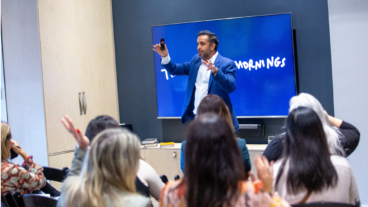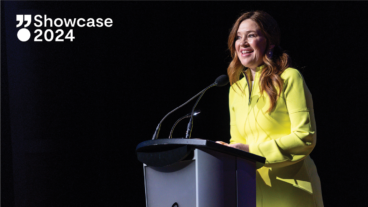Studies have shown that practicing gratitude daily can lead to a decrease in inflammatory biomarkers, blood pressure, and risk of heart disease. As a gratitude practitioner himself, Neil Pasricha has co-authored a new journal, Two Minute Evenings, to help jumpstart a daily gratitude practice and encourage a more peaceful, restorative sleep.
Neil co-wrote Two Minute Evenings with his wife, Leslie Richardson. It’s based on a practice Leslie grew up. Taking just two minutes, it’s a quick and easy reflection that forces you to scroll back through the day until you find:
- A Rose, or a highlight (gratitude) of something that went well.
- A Second Rose: Another highlight, little win, or small pleasure from the day.
- A Thorn: Something that didn’t go well. This is a chance to vent, process, and be heard.
- A Bud: Something to look forward to — small or big, soon or coming up.
The Science Behind Gratitude
This simple tool that Leslie’s mother learned as a child is backed by science. Here’s how:
Rose
Roses are good for us! In 2003, the foundational study, “Counting Blessings Versus Burdens”, conducted by Robert Emmons and Michael McCullough showed that students who wrote down “gratitudes” —versus test groups who wrote down “hassles” or “events” — weren’t just happier but also physically healthier after a 10-week period.
Thorn
A 2006 meta-analysis by Joanne Frattaroli, published in the Journal of Consulting and Clinical Psychology, shows that writing about emotional experiences, including negative ones, improves well-being and reduces stress.
Bud
Finally, the bud. This allows us to finish the game by sharing one thing we’re looking forward to. A 2005 paper from Sonja Lyubormirsky, Kennon Sheldon, and David Schkade called “Pursuing Happiness,” published in Review of General Psychology, shows that setting and anticipating future goals and events makes us happier.
How to Practice Gratitude Effectively
The key in effectively practicing gratitude is to be specific in what we’re saying, Neil says. For example, a rose could be:
- Getting to the meeting late but the boss getting there even later
- The fact that he wrote me back
- The half hour of silence I got when both kids were napping.
A second rose could be:
- How cold the shower was at the end of my run.
- When our song came on right after I picked you up from work.
- The feeling of her sleeping on my chest.
A thorn could be:
- Still not hearing back from the doctor.
- Texting something snarky to my sister.
- Falling into a social media hole.
Lastly, a bud could be:
- Making a stack of pancakes on Saturday.
- When my dad’s surgery finally gets scheduled.
- Renting a villa in Morocco when I turn a hundred years old.
Through Neil and Leslie’s Two Minute Evenings, they’re sharing a way we can all live more connected, healthier, and happier lives. And, most importantly, end each day with intention.
A Harvard MBA, New York Times bestselling author, and one of the most popular TED speakers in the world, Neil Pasricha draws on the latest research to show audiences how to enhance individual performance and create a more positive and productive workplace.
Neil shares science-backed tools and practices in his popular keynotes to help audiences cultivate positive mindsets, breakthrough performance, and healthier habits.
Contact us to learn more about Neil and how to book him to speak at your next event.




